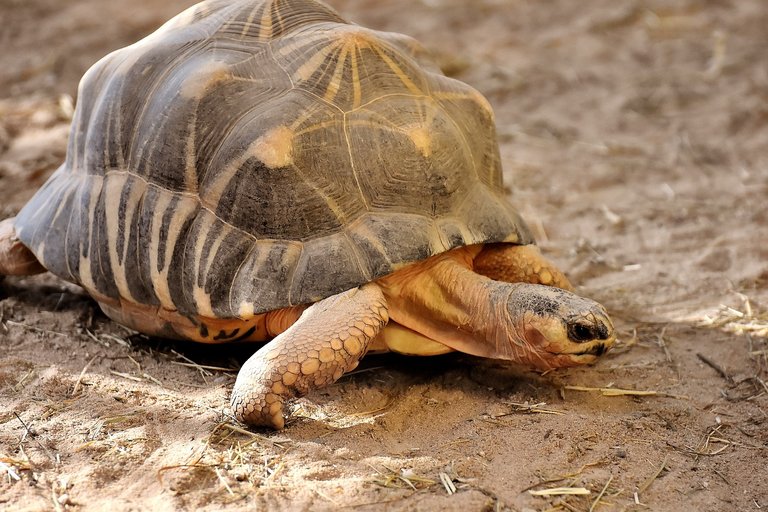Achilles and the Tortoise the Puzzling Paradox

This thought puzzle was created the famous pre-Socratic Greek philosipher Zeon of Elea. The paradox has been remembered throughout the ages as one of the most perplexing enigmas. Do you think you have what it takes to solve it? Lets find out.
The Puzzle
One day a tortoise challenged the mighty warrior of troy Achilles to a footrace. Achilles being the proudest, handsomest and mightiest warrior takes this as a joke and laughs. "How could a a heavy and slow creature like you beat me, the fastest of all the warriors of troy in a foot race?!"
"Race me and find out." says the tortoise. "but under one condition" he adds.
Achilles taking it as a joke says, "Of course! Name your price."
"A ten meter head start should do" the tortoise says.
"A meager 10 meters?" Achilles scoffs "No matter. You will still surely lose"
The tortoise being quicker in wit then Achilles says, "Do not be so sure of yourself. You may be fast but I can secure my victory even in argument."
"Go on then. Let's hear it" Achilles says less confidently knowing the tortoise is wise and having many arguments to him.
"Think about this" says the tortoise. "If I start 10 meters ahead of you, do you think you can sprint that distance fairly quickly?"
Achilles with no hesitation says, "Of course! I am the fastest hero of Troy!"
"Now, in the time that it would have taken you to get to me, would I not have gone a small distance?"
"Yes" confirms Achilles.
The tortoise continues. "Now how fast do you think you could cross that distance?"
"Faster than yous..." Achilles says pondering at what the tortoise is getting at.
"And in the time it takes you to get to me, would I have not gone even further?" the tortoise says, now with a smirk on his face. "Now if each moment it takes you to catch up to me, I go a bit further, when will you catch up?" he adds.
Achilles pauses and thinks about this for some time. "I am not sure." he says in bewilderment.
The tortoise, now very happy with himself says, "In each moment that you spend catching up to me, I go a bit further. No matter how small the distance I go is, you will always be catching up, is this not true?"
Achilles now very uneasy says, "Yes. I suppose you are correct". Being defeated in thought once again by the tortoise he concedes from the race.
Summed up
This can be simplified down to this, consider that you want to walk to the fridge to get a drink. To first get to the fridge you first must cover half the distance first. To cover half that distance you must first cover half of half that distance. And to do that you need to cover half of half of half that distance and so on. In theory you shouldn't be able to cover any distance and nothing would move. Of course this isn't the case so how can this be?
Solution
The first thing to be understood here is that we are assuming that you are dividing a finite distance and time into an infinite number of tinny increments. This is called an infinite series. What this looks like is...
1 + ½ + ¼ + ⅛ + ...
It basically divides a finite thing into an infinite number of things. When you add all them together you should get the entire finite thing you started with. I will explain how this is done on a basic mathematical level as it is hard to wrap out minds around when dealing with arbitrary infinite numbers. First things first - lets give our series a name. In this case I will use "P".
P = 1 + ½ + ¼ + ⅛ + ...
Now multiply this by ½ and multiply each number within it by that. You'll get something like this.
½ P = ½ + ¼ + ⅛ + ...
Now if you subtract the series you started with by the new one you will get something like this,
½ P = 1 Using basic algebra this can be simplified down to P = 2
What this really means is that when you need to go to the fridge that is 2 meters away, despite having to break down the distance infinity, you have still going 2 meters which holds true in reality, however this doesn't account for time yet. In Zeon's paradox as you divide the distance down it still takes time to go the distance, so in theory it will take an infinite amount of time to move any distance. Of course, this isn't the case, and it is for the same reasons as said above and the infinite series has an end.
Now the questions is, how can an infinite series end? I do not have a single solution for you and it is something that people have been pondering at for almost 3,000 years. I didn't offer a solution per say but more of a very basic explanation of it. If you want to learn more and possibly solve this mind bender you'll have to dig into some calculus which I may expand on in a later post.
I would really like to hear what people have to say on this paradox and their own solutions. If you have questions or comments leave them bellow. Thanks for reading!
Credits:
☛ cdn.pixabay.com/photo/2017/04/12/01/26/giant-tortoise-2223369_1280.jpg
☛ www.iep.utm.edu/zeno-par/
☛ platonicrealms.com/encyclopedia/zenos-paradox-of-the-tortoise-and-achilles
☛ www.youtube.com/watch?v=NCtw5f6XPF4
Get a long stick and flip the tortoise over.
Real-world problems demand real-world answers.
Best answer 2k17